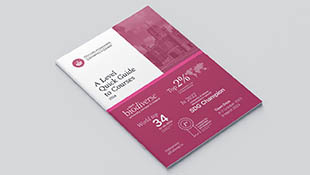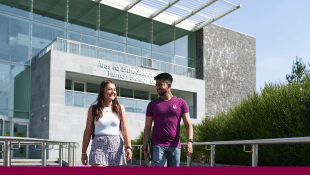-
Courses

Courses
Choosing a course is one of the most important decisions you'll ever make! View our courses and see what our students and lecturers have to say about the courses you are interested in at the links below.
-
University Life

University Life
Each year more than 4,000 choose University of Galway as their University of choice. Find out what life at University of Galway is all about here.
-
About University of Galway

About University of Galway
Since 1845, University of Galway has been sharing the highest quality teaching and research with Ireland and the world. Find out what makes our University so special – from our distinguished history to the latest news and campus developments.
-
Colleges & Schools

Colleges & Schools
University of Galway has earned international recognition as a research-led university with a commitment to top quality teaching across a range of key areas of expertise.
-
Research & Innovation

Research & Innovation
University of Galway’s vibrant research community take on some of the most pressing challenges of our times.
-
Business & Industry

Guiding Breakthrough Research at University of Galway
We explore and facilitate commercial opportunities for the research community at University of Galway, as well as facilitating industry partnership.
-
Alumni & Friends

Alumni & Friends
There are 128,000 University of Galway alumni worldwide. Stay connected to your alumni community! Join our social networks and update your details online.
-
Community Engagement

Community Engagement
At University of Galway, we believe that the best learning takes place when you apply what you learn in a real world context. That's why many of our courses include work placements or community projects.
Why Study Abroad?
Studying abroad gives students a chance to study immersed in a different culture, overcome challenges, meet new people, and learn in a whole new way. Students often reflect on their semester or year abroad as being hugely beneficial for a variety of reasons. It also has it's challenges. It's important to consider both before you decide to study abroad.
Benefits of Studying Abroad
Personal Growth
Studying abroad can be transformative on a personal level. Stepping out of your comfort zone, living, and studying in a new country will help you grow in confidence. It will give you an increased level of independence and self-awareness. Not to mention all the new friendships that you'll form along the way. You may face some challenges whilst abroad but overcoming these will broaden your mind and give you a deeper understanding of yourself and the world.
Global Perspectives
A global perspective is seeing and understanding how any situation impacts or relates to people around the world. Studying in a classroom with a new group of lecturers and students will allow you to look at, and solve problems differently. You'll see Ireland from a different perspective too and have your preconceptions challenged.
Not only are you studying immersed in a different country and culture, you will also be studying with a cohort of students from around the world with different cultures and views to your own.
Academic Opportunities
Studying abroad gives you the opportunity to take modules that may not be available as part of your programme so you gain a more rounded perspective on your chosen field of study. You may also be able to take some modules outside of your field of study that you wouldn't have the opportunity to do normally as part of your programme. Teaching and assessment at partner universities can also differ from home universities.
Employability
In the competitive job market, many employers are seeking graduates with global experience. Employers feel students that have studied abroad gain transferable skills for the workplace such as openness, flexibility, communication and the ability to embrace different perspectives. Students that complete traineeships abroad can sometimes return to the host company to work following graduation.
Improve Language Skills
One of the best ways to learn a new language is to be completely immersed in it. A classroom setting at home will be a different experience to needing to use the language on a daily basis in lectures, with friends, and going about your daily life. You will learn colloquialisms, slang and nuances about the language that you don't necessarily learn at home. Even if you are attending a Study Abroad programme through English, often language courses are available in the host countries language to give you a full cultural immersion.
New Life Experiences
Seize your study abroad experience – you will have the chance to explore new places, take up a new hobby by joining one of the many clubs and societies available at partner universities. You can eat like a local and try some new cuisine. And then when you return, you can give back and help incoming study abroad students adjust to life in Galway.
Challenges of Studying Abroad
High Cost
There can be a considerable financial burden on students that partake in a study abroad opportunity. Especially in destinations like North America where there is limited to no grants available to students. The best thing you can do is plan early, research the cost of living in different available destinations, and create a budget for your time away. You may find that in some destinations that the cost of living is actually cheaper than at home in Ireland.
Culture Shock
After the initial excitement of arriving in a new country wears off, you may find yourself feeling homesick, or you could find that the destination is nothing like you imagined. It could be a case that ways of doing things in your new university are completely different to how they're done back home. You may find yourself feeling frustrated, sad or overwhelmed. These feelings are perfectly normal. We've listed some tips below for helping to overcome culture shock.
Language Barrier
Arriving in a new country and speaking a different language can be difficult to adjust to. A classroom setting is a very different environment to total immersion. You may find different accents that are harder to understand.
Reverse Culture Shock
Some students don't want to leave once they get to the end of the study abroad period and can experience reverse culture shock once they return home. You may feel bored or restless as your home environment isn't as exciting as the adventures you were having during your time away. Some people may experience 'reverse homesickness' where they miss the place they've left and the friendships they forged. If you've returned a changed person, friends and family may find it difficult to adjust to the new you. Gooverseas have some helpful tips for managing reverse culture shock.
Tips for overcoming Study Abroad challenges
- Do your research. Learn as much as you can about your destination before you arrive. If possible, ask to be connected with students who have been there before so that you can manage your expectations. Or meet with current exchange students visiting University of Galway so that they tell you of the differences to expect.
- Understand your academic expectations. You will be studying in a completely different academic environment. Check in with your academic coordinator so that you're clear on how many credits you will need to take before you leave. Research available modules that you would like to take at your host. It may the case that some of your preferred modules are not available due to timetable clashes so be prepared for this and identify some alternative modules.
- Keep an open mind. You are not at home so things will be different. It's unlikely that you'll be doing the same things you've always been doing. Hearing new perspectives and doing things differently is part of the experience. Embrace the differences!
- Go easy on yourself. Adjustment to a new destination takes time. It can be frustrating or confusing when things work differently to how they would at home. Give yourself time to work out how things work. Talk your friends or other exchange students, as they may be experiencing the same frustrations and you can work things out together. You can contact the host university coordinator if your finding new systems difficult to navigate.
- Get involved.
- Join a buddy programme – many universities offer a buddy programme for new exchange students where you're partnered with a current student for help and advice.
- Join the Erasmus Student Network or International student society at the host university - here you can connect with other international students sometimes before you arrive at your destination. Some societies organise events throughout the exchange period and they're a great place to meet new people.
- Attend Orientation events or welcome weeks so you can meet with other students also starting out on their study abroad journey.
- Take part in clubs and societies - Like University of Galway, your host university will have a range of clubs and societies that you can join. Many organise meet ups, events and trips away so can be a great way to explore your new area, and make friends along the way.
Testimonials
Testimonials are coming soon.
Downloads
-

Undergraduate Prospectus 2024 PDF (14.6MB)
-

Postgraduate Prospectus 2024 PDF (3.3MB)
-

Quick Guide to Courses 2024 PDF (1.20MB)
-

A-Level Quick Guide to Courses 2024 PDF (1.04MB)
-

Pre-Arrival Guide 2023 PDF (2.1 MB)
-
.png)
Brazil Student Guide PDF (3.2 MB)
-
.png)
Chile Student Guide PDF (3.1 MB)
-
.png)
Colombia Student Guide PDF (3.1 MB)
-
.png)
Ghana Student Guide PDF (3.4 MB)
-

Hong Kong Student Guide PDF (3.6 MB)
-

Indian Student Guide PDF (3.5 MB)
-
.png)
Indonesian Student Guide PDF (3.2 MB)
-

Malaysian Student Guide PDF (3.6 MB)
-
.png)
Mexico Student Guide PDF (3.1 MB)
-

Nigeria Student Guide PDF (3.4 MB)
-
.png)
North American Student Guide PDF (2.9 MB)
-
.png)
Panama Student Guide PDF (3.1 MB)
-

South African Student Guide PDF (3.7 MB)
-
.png)
Taiwan Student Guide PDF (4.0 MB)
-
.png)
Thailand Student Guide PDF (3.6 MB)
-
.png)
Turkish Student Guide PDF (4.2 MB)
-
.png)
UAE Student Guide PDF (3.4 MB)
-
.png)
Vietnam Student Guide PDF (3.39 MB)















